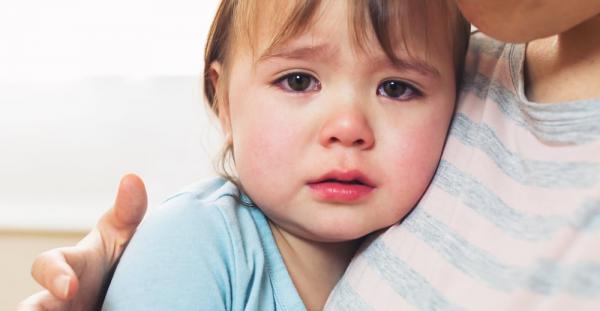
Watching their bottom lip start quivering and the tears well up in your little one's eyes when you leave for work is heartbreaking, but going through the same tantrum reaction when you step out to go to the bathroom for less than two minutes is just the worst.
These are all signs of separation anxiety, and the good news is, your child isn't crazy. It's just part of their normal development.
"They think you've gone for good," parenting coach Sue Atkins said. "Whether you're in the kitchen, in the next bedroom, or at the office, it's all the same to your young toddler. You've disappeared, and your child will do whatever he or she can to prevent this from happening."
So if you're dealing with total meltdowns when you need a few minutes alone in the bathroom, or when you drop your baby off at school, here are a few tips experts suggest to help your child (and you) deal with separation anxiety.
1. Don't sneak out
It's tempting to do this, because it feels like you are saving your baby unnecessary concern, but in the long run, child psychotherapist Katie Hurley said this can create more stress for your child later on.
"Acknowledge your child's feelings and normalize his worries," Hurley said. "It's perfectly natural to feel a little bit scared, and a little bit of empathy can help your child feel safe and understood."
2. Be cheerful when you say goodbye
Your child sometimes mirrors your behavior. Even if you're sad to be leaving, you want your baby to feel safe and have fun while you're gone.
Hurley recommends being particularly mindful of your body language when you're saying goodbye.
"Stand up straight and smile for your little one to model a cheerful goodbye!" she said
3. Plan leaving times after naps or meals
Atkins recommends trying to leave when your child is most likely the least emotional, which means avoiding times they tend to be more tired, hungry or restless.
4. Make an exit ritual
Hurley recommends creating a ritual such as:
-
Having a special handshake or wave
-
Have a goodbye hug, kiss or high five
-
Have a specific object that you "fill with love" and give to the child before you drop them off. This could be a rock, a picture, etc.
Whatever you do to exit, just be calm and consistent
5. Use time frames your child can understand
"Say a pleasant, loving, and firm goodbye," Atkins recommends. "Stay calm and show confidence in your child. Reassure them that you'll be back - and explain how long it will be until you come back"
Time is still something that's really hard for your toddler to understand, so frame it in a way that would make more sense to them - like saying it will be after their nap, or after lunch.
6. When you say you're leaving, LEAVE
Don't drag it out, and don't come back. Atkin says this will only make things worse.
7. Come back when you say you will
"It's very important to make sure that you return when you have promised to," Atkin outlines. "This is critical - this is how your child will develop the confidence that he or she can make it through the time apart. So don't let them down - it will frighten them."
8. Read books they can relate to
Several fun kids books address separation anxiety. Hurley recommends reading "Llama Llama Misses Mama" by Anna Dewdney or "The Kissing Hand" by Audrey Penn with your child.
More than anything, remember that this era will pass. You're not forever going to be prying away frantic hands from your legs, and your child will be OK when you leave to run an errand - no matter how much it seems right now that they won't.

